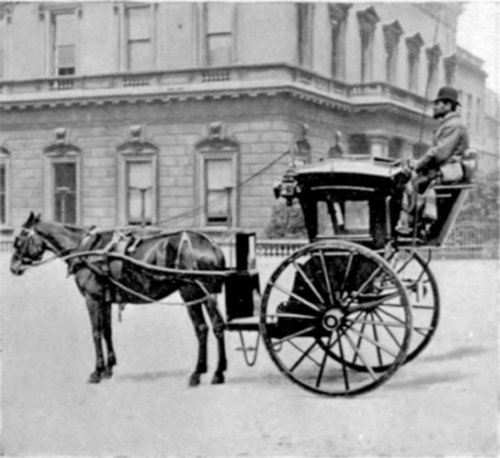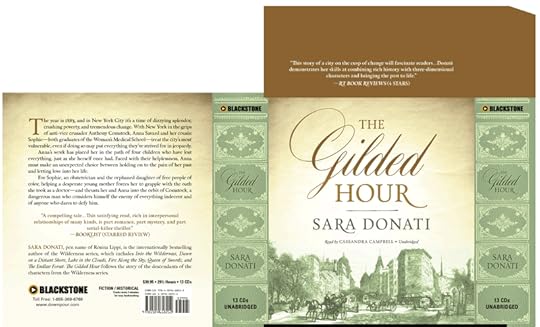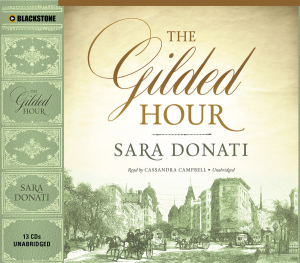Rosina Lippi's Blog, page 16
August 8, 2015
The Paradise Sun: Revisiting Paradise
On Sara’s FaceBook page Paula asked about the newspaper articles I posted, once upon a time, that didn’t actually show up in any of the Wilderness novels. I went to have a look, and I do have a small pile of them. Some of them are pretty sad, and some are amusing. I’m going to post a few of them, one or two at a time, between now and the release of The Gilded Hour.
The newspaper, founded by Elizabeth Bonner, had this masthead:
Here’s one small article. 
Tweet

Having trouble commenting? Two fixes. I hope.
 I think I’ve identified the problem some people are having with leaving comments. It seems that the only time this is a problem is when people are on a mobile phone using a browser. The weblog is set up to be mobile-responsive, but clearly that isn’t working for some people.
I think I’ve identified the problem some people are having with leaving comments. It seems that the only time this is a problem is when people are on a mobile phone using a browser. The weblog is set up to be mobile-responsive, but clearly that isn’t working for some people.
Joelle has run into this and worked out a solution:
I have found that if I am reading the post through the bloglovin app or if I link to it from Twitter or Facebook then I don’t see the comments or the comment form. But I’m always on my phone when I do that. And if I click to view full site it all works just fine. Ironically, if I try to view the website from the laptop it always defaults to the mobile version so I have the same problem. Again, clicking to view full site fixes it.
Another solution: if you routinely read the weblog and comment by iphone or android, this would be solved by subscribing to get posts by email. You could then comment (and enter giveaways) by answering the email, avoiding mobile browser complications completely. If you try this out could you please leave a comment here (assuming you can) to tell me so? Thank you for your help with this.
Tweet

August 7, 2015
Creaky old bones, in the ether.
I’ve been hearing quite often from people who have not been able to enter contests/giveaways because they just can’t get the comment system to work. I’m trying to figure out (1) what exactly is wrong and (2) how to fix it. I really dislike the idea that people who want to enter giveaways can’t. If you could please answer this poll (you can chose more than one answer), and further, if you have had problems, be specific on the nature of those problems in the comments or by email, I would much appreciate your help.
Note: There is a poll embedded within this post, please visit the site to participate in this post's poll.
Tweet

August 6, 2015
Cure my fits.
 I’m always looking for novels set in the same time and place that I’m writing about, a kind of professional curiosity. How do other authors handle X or Y or Z? A detail oriented historical novelist won’t just have a character drive off somewhere in 1883 without some idea of the details. What kind of carriage?
I’m always looking for novels set in the same time and place that I’m writing about, a kind of professional curiosity. How do other authors handle X or Y or Z? A detail oriented historical novelist won’t just have a character drive off somewhere in 1883 without some idea of the details. What kind of carriage?
Look at the page for horse-drawn vehicles on Wikipedia to get an idea of the magnitude of the question.
You’re thinking I’m obsessive. Of course I’m obsessive, I write historical fiction. But if you were reading a novel set in 1950 and found the characters jumping in a Prius to head out of town, that would have to ruin the whole lovely sense of time and place that is the beginning and end of historical fiction. Thus my need to know what kind of vehicles my characters would be familiar with. Would the rich have a landau in 1883? A barouche? How rich would you have to be to keep your own stable? (Answer: very rich).
That simplifies things, because this character is well off, but not rich. So good, I put her in a cab… but wait. What’s it like in there? Cushions? Dirty windows? Permeated with cigar smoke? A leaking roof? How does she talk to the cabby? What does she call him? How is the money handled? Does he climb down off his seat to help her into and out of the cab?
If there were dozens of novels written about this time and place I could peruse them for hints to follow up with research. Am I worried about unethical borrowing? Trick question: it’s impossible to find any novels set in New York city in the early 1880s. Such creatures are rare in the wild.
There are a lot of novels set NYC in the 1890s. For example, Caleb Carr’s excellent The Alienist. But there’s a big gap between 1883 and 1893 — especially in technological terms. If I’m reading The Alienist or a novel like it, I dare not trust any detail without checking into it myself. Hundreds of buildings went up in that time period, and I hate the idea of putting one of my 1883/4 characters into a building that wasn’t there yet.1 When I do run into a novel in the approximate right time and place, mostly I’m disappointed because that author obviously has a life, and is content to write a good story without seeking out specifics on gas lighting fixtures in public places. Or the cost of a good carriage horse. Or how gloves were sized. Or how doctors and pharmacists communicated and kept records or how the public baths looked and smelled and worked.
So, no novels. So I have to turn to reference works (usually dodgy). How about contemporaneous novels, written in the right time period? Harder to research, but yes, that is helpful material. Newspaper ads, personal diaries, correspondence. All this for a ten minute cab ride from Washington Square to Stuyvesant Square.
 Or maybe what I really need is just this Boots guy, who was advertising in the New York papers in 1883-1885.
Or maybe what I really need is just this Boots guy, who was advertising in the New York papers in 1883-1885.
What I want is a club of obsessive compulsive historical novelists who live and breath New York city in 1883-1885. And who live in the Pacific Northwest. And who are willing to sit down together say, three times a week, sometimes at two in the morning, to go over what we know and don’t know and delight each other with tidbits.
Is that too much to ask?
Here’s a conundrum. Once I know that on a given block three buildings were going up, do I just ignore that when my characters pass by? ↩
Tweet

August 5, 2015
Confusion, solutions, and one more unabridged audiobook drawing NOW with a poll!
Part I: Minor Disasters
Things sometimes go wrong on a weblog of this size. Bits stop working, and I may not notice at all unless somebody emails to point it out to me.
Recently the comment form stopped working. Maybe not even recently, maybe for months. But somebody found another way to contact me and brought it to my attention. So it was an endless loop: if you wanted to tell me about a problem and the only way you know to reach me is through a broken contact form, then you were out of luck. I apologize. I believe that you won’t have any further problems. If you do, please leave a comment (also an issue; see below.) Technology. Can’t live with it, can’t market books without it.
The more serious situation is when somebody finds their way over here and then can’t comment at all because the comment form isn’t showing up — which means, they can’t enter the big big giveaway, or anything else, for that matter. One person emailed to say that on the original post for the big big giveaway, she sees no comment box at all. I’ve looked into this and cannot find a way to fix it,
Part II: Solutions
A. The contact button above will take you to a simpler way to email me.
B. If you want to enter the big big giveaway but don’t see a comment box, remember that any comment you make here, on any post, counts as another entry for that giveaway.
Part III: Audiobook Antics

I ran two giveaways for the unabridged audio edition of The Gilded Hour. One on Twitter, that didn’t go so well, and one on FaceBook that went like crazy. To encourage you to comment (especially if you’ve been frustrated in the past), I’m giving away one more unabridged audiobook. Note: this is open to anyone, but if you’re outside the United States I’ll have to get creative about how to get the audiobook to you. It may require some patience. Note also: if you don’t use Audible,com, there is the possibility of receiving the actual 13 CDs in the box you see above. You have two ways to enter this drawing, and you can use both of them for two entries, if you like.
Note: There is a poll embedded within this post, please visit the site to participate in this post's poll.
1. Leave a comment on this post and in it tell me in a sentence or two who your favorite bad-guy was in the Wilderness series (and if you haven’t read it yet, you can just say so; still counts). If you don’t want to leave any comment, please feel free to answer the poll — although this won’t serve as an entry in the drawing. All poll votes are anonymous.
2. Sign up for commenting by email over in the right hand column under “Commenting Made Simple.” Clearly you don’t have to do this, but if you do, you’ll have a double chance of winning the audiobook. If you’ve already signed up for that feature, you are already entered in the drawing.
Don’t forget: when you comment on this post you are also entering your name into the big big giveaway. I’ll end this drawing on Saturday at midnight, PST.
Tweet

Confusion, solutions, and one more unabridged audiobook drawing
 Part I: Minor Disasters
Part I: Minor DisastersThings sometimes go wrong on a weblog of this size. Bits stop working, and I may not notice at all unless somebody emails to point it out to me.
Recently the comment form stopped working. Maybe not even recently, maybe for months. But somebody found another way to contact me and brought it to my attention. So it was an endless loop: if you wanted to tell me about a problem and the only way you know to reach me is through a broken contact form, then you were out of luck. I apologize. I believe that you won’t have any further problems. If you do, please leave a comment (also an issue; see below.) Technology. Can’t live with it, can’t market books without it.
The more serious situation is when somebody finds their way over here and then can’t comment at all because the comment form isn’t showing up — which means, they can’t enter the big big giveaway, or anything else, for that matter. One person emailed to say that on the original post for the big big giveaway, she sees no comment box at all. I’ve looked into this and cannot find a way to fix it,
Part II: Solutions
A. The contact button above will take you to a simpler way to email me.
B. If you want to enter the big big giveaway but don’t see a comment box, remember that any comment you make here, on any post, counts as another entry for that giveaway.
Part III: Audiobook Antics

I ran two giveaways for the unabridged audio edition of The Gilded Hour. One on Twitter, that didn’t go so well, and one on FaceBook that went like crazy. To encourage you to comment (especially if you’ve been frustrated in the past), I’m giving away one more unabridged audiobook. Note: this is open to anyone, but if you’re outside the United States I’ll have to get creative about how to get the audiobook to you. It may require some patience. Note also: if you don’t use Audible,com, there is the possibility of receiving the actual 13 CDs in the box you see above. You have two ways to enter this drawing, and you can use both of them for two entries, if you like.
1. Leave a comment on this post and in it tell me in a sentence or two who your favorite bad-guy was in the Wilderness series (and if you haven’t read it yet, you can just say so; still counts).
2. Sign up for commenting by email over in the right hand column under “Commenting Made Simple.” Clearly you don’t have to do this, but if you do, you’ll have a double chance of winning the audiobook. If you’ve already signed up for that feature, you are already entered in the drawing.
Don’t forget: when you comment on this post you are also entering your name into the big big giveaway. I’ll end this drawing on Saturday at midnight, PST.
Tweet

August 4, 2015
Why did you kill your wife? Or: a new excerpt from The Gilded Hour

19th century Italy, via Miklian Maps
Quite some time ago I posted here and on FaceBook, asking for help with translating a single sentence (“Why did you kill your wife?”) into a wide variety of European languages and dialects of those languages.
The response was terrific, and tremendously useful. Over a couple weeks I learned the sentence in something like ten dialects of Italian, five of French, six of German, and a handful of Norwegian, Swedish, Spanish (European, and different parts of South and Middle America), Dutch, Portuguese, and a slew of other languages.
At the time I said that I needed this information for a scene I was writing, and that I would reveal all at some point in the future. So here we are in the future, and here’s an excerpt from The Gilded Hour that will make it all clear. You may wonder, after you read it, about the translations I haven’t used yet. For those you’ll have to wait for the next novel.
This is a scene between Jack Mezzanotte, a detective-sergeant with the NYPD, and Anna Savard, a physician and surgeon. The year is 1883, and they are in Manhattan. They don’t know each other very well, but have been conversing for a while about their jobs. The scene is from Jack’s point of view.
The Gilded Hour
Sara Donati
All Rights Reserved
She said, “Do you think that a woman wouldn’t be able to cope with the realities of the work you do?”
This tone he understood; she was irritated and willing to let him know that.
“Your sensibilities don’t strike me as fragile,” he said. “So let me tell you about yesterday morning. A cobbler with a business on Taylor Street killed his wife. He is more than seventy, she was less than thirty.”
She seemed to be interested. “Jealousy?”
“Italians make an art of it. So we got the call and went out, but the cobbler disappeared before we got there. We spent most of the day looking for him and were about to give up—it was just getting dark—when he walked past me. This was in the Italian colony in Brooklyn. It’s not hard to disappear for a few days at a time over there.”
Anna said, “You recognized the cobbler?”
“I had a description—short, bald, a gray mustache—”
“That must describe hundreds of men. You’re smiling. Is there a joke here somewhere?”
Jack rubbed the corner of his mouth with a knuckle. “Not a joke, but maybe a bit of a secret weapon. I’ll tell you how I caught him: I asked him a question.”
She made a gesture with her hand, impatient for him to go on.
“I was standing on the corner when he walked past me. He fit the description so I said, ‘Hey, Giacalone!’ and he stopped and turned. Then I said, ‘So why did you kill your wife?’ He told me, and I arrested him. End of story.”
She had stopped and was looking at him the same way he might look at a pickpocket with a dodgy alibi. “Why would he do that? Just because you used his name?”
“Don’t you turn when somebody calls your name?”
“Yes, probably. But I wouldn’t confess to a crime on that basis. There must be something more to it.”
She liked puzzles, clearly, and would ask questions until she got to the bottom of things.
“Yes, there was more to it. I said it in his language.”
“You spoke Italian.”
“Sicilian.”
“They don’t speak Italian in Sicily?”
“The Italians in Sicily do. The Sicilians do not. I can see you don’t believe me, but it’s true.”
“Say it for me. First in Italian and then Sicilian.”
“A command performance,” Jack said, giving her an exaggerated bow from the shoulders. “‘Perchè hai ammazzato la tua donna?’ would be a colloquial, friendly Italian. ‘Picchì a ttò mugghieri l’ammazzasti?’ is Sicilian. Or one kind of Sicilian.”
They walked on, and he could almost hear her thinking, looking for flaws in his story.
“There is more than one Sicilian language?”
“Dozens of dialects of Sicilian. Hundreds of dialects of Italian.”
“How is it you speak Sicilian?”
“I don’t, really. I just have a collection of sentences at the ready.”
Her mouth contorted as if she were repressing a smile. “Do tell.”
“‘Why did you kill your wife—or friend, or neighbor?’ ‘What did you do with the money you took?’—that kind of thing.”
“Are Sicilians responsible for most of the crime?”
“Oh, no,” Jack said. “Which is why I know how to say those crucial sentences in more than one kind of Italian.”
She was quiet for a full minute. “Detective Sergeant Mezzanotte,” she said a little huffily, “I think you’re pulling my leg.”
“Test me, then, if you don’t believe me.”
“All right. Florence.” She said it as if she knew for a fact that the men of Florence would never kill their wives.
He smiled openly at that. “‘O perché tu ha’ammazzaho la tu’ moglie?’”
She pressed her lips together while she thought. “Of course I have no way of knowing if that’s right. You could be making it up out of whole cloth.”
He laughed, and very deftly took her hand and hooked it through his crooked arm.
“Your claim,” she began after a long pause, “is that this man was so taken by surprise to find a countryman that he let his guard down.”
“Something like that.”
“I find it hard to imagine.”
“If you found yourself on the other side of the world in a country where you were disliked and distrusted on sight and you didn’t speak the language—”
“I would learn the language.”
He glanced at her. “You would learn the language. But you would miss your own language, your people. In a crowd you hear nothing but this other language that has been so much work for you, it gives you a headache sometimes trying to follow. The people you talk to make fun of your accent, the way you turn sentences around. They insult you to your face. Then all of a sudden you hear somebody speaking your language. The language of your town and family, the language you heard around the dinner table as a little girl, or playing with other little girls like yourself. It’s like being handed a wonderful present with no warning. Suddenly you’re not alone in the world.”
She was listening closely, her head canted. “When you put it like that, yes. I can see it. To put it bluntly, you took advantage of his loneliness.”
“He killed his wife,” Jack said. “His feelings are not my concern.”
“So you only pursue Italian-speaking criminals.” Her tone was vaguely disbelieving and he wondered what she had up her sleeve.
“I never said that. I arrest all kinds of people, young and old, rich and poor. This week I arrested a banker, an associate of the Astors whose family has been here for two hundred years. For embezzlement, a rich man’s crime.”
“But your secret weapon works only with Italians.”
“Dr. Savard, do you begrudge me my professional tools?”
“No,” she said, and bit her lip. “Maybe a little. I am glad that the rest of the world is safe from your tricks.”
He lifted a brow, and saw her expression shift.
“Now you are boasting. How many languages do you speak?”
“I don’t know,” Jack lied, just to see her expression. “I’ve never counted.”
Tweet

August 3, 2015
Gilded Hour Unabridged Audio: 29.5 hours
I just now got this image for the unabridged audio/cd edition from Blackstone. Note the whopping 29.5 hours. Here’s a small confession: I won’t spend an Audible credit on a book that’s less than ten hours long, and generally, unless I am very, very interested in the novel, I want twelve hours for that credit. So for my tastes, 29.5 hours is great.
The Gilded Hour is still not showing up on Audible.com, but it should be there within the next few days, according to my agent.
Oh and, I’m giving away a copy of the unabridged audio on the Facebook Sara Donati page. Drawing on Tuesday evening, so go throw your name in the hat.

Tweet

August 2, 2015
Ariana Franklin: Gone, but then again, Here
 I have been reading Ariana Franklin’s work for twenty some years, starting with her earliest novels, published under Diana Norman (her own name). We had a correspondence for about five years, up until her sudden death in 2011 at age seventy-seven. In 2008 I posted an interview with her, which I updated in 2011 shortly after her death.
I have been reading Ariana Franklin’s work for twenty some years, starting with her earliest novels, published under Diana Norman (her own name). We had a correspondence for about five years, up until her sudden death in 2011 at age seventy-seven. In 2008 I posted an interview with her, which I updated in 2011 shortly after her death.
It’s unclear to me how this happened, but I somehow missed the fact that her last (unfinished) novel came out in February, and that this was possible because her daughter Samantha Norman, a journalist, took on the challenge and brought The Siege Winter to publication. In March Samantha wrote an essay on Bookish about her mother and what it was like to pick up where she left off.
I learned everything from my mother, and this isn’t just me eulogizing about her because she’s dead and I’m still grieving for her terribly. It’s simply a fact that I happened to be born to one of the most intelligent women there ever was. From that point of view, I am and was extremely fortunate. Although, that is not to say that it was always an easy ride exactly: Brains and ambition are inextricably linked and just as she strove to be the very best she could be, she was also quite adamant that I, her daughter, should be too. Samantha Norman: Finishing My Mother’s Last Novel.
I admit: I hesitated about reading The Siege Winter. I wanted to like it. I wanted to love it, and I was afraid I wouldn’t be able to. But I can now say that I waited so long for no good reason. It is, quite simply, a wonderful novel. I don’t believe in an afterlife, but if there were one, I could imagine Diana cheering.
The Siege Winter takes as its backdrop what historians refer to as “The Anarchy,” a civil war in the mid 12th century when a succession crisis followed the death of William Adelin (the only legitimate son of Henry I) and then Henry I. Henry wanted his daughter Empress Matilda to take the crown, but his nephew Stephen of Blois had other ideas. With the resulting war as backdrop the novel takes on the lives of three women: a young girl left for dead after she is raped and mutilated; the chatelaine of Kenniford castle; and the Empress Matilda herself.
The power of Diana Norman’s novels was always her ability to bring the lives of women into sharp focus. It’s amazing, really, how Samantha Norman picked up an unfinished novel and carried on without a hitch — I, at least, couldn’t tell where one author stopped and the other picked up. The crackling sharp wit that characterizes DN’s work is still there, as are the empathy and multi-layered characterization and deft handling of a complex plot. I hope SN has caught the historical fiction bug, and will be able to put down journalism to build on this strong foundation.
Tweet

July 29, 2015
Unabridged Audio Giveaway: The Gilded Hour
 Stop by Twitter to win The Gilded Hour on unabridged audio: here, running until Friday evening. Next week I’ll give another copy of the unabridged audio away on Facebook.
Stop by Twitter to win The Gilded Hour on unabridged audio: here, running until Friday evening. Next week I’ll give another copy of the unabridged audio away on Facebook.
Tweet





